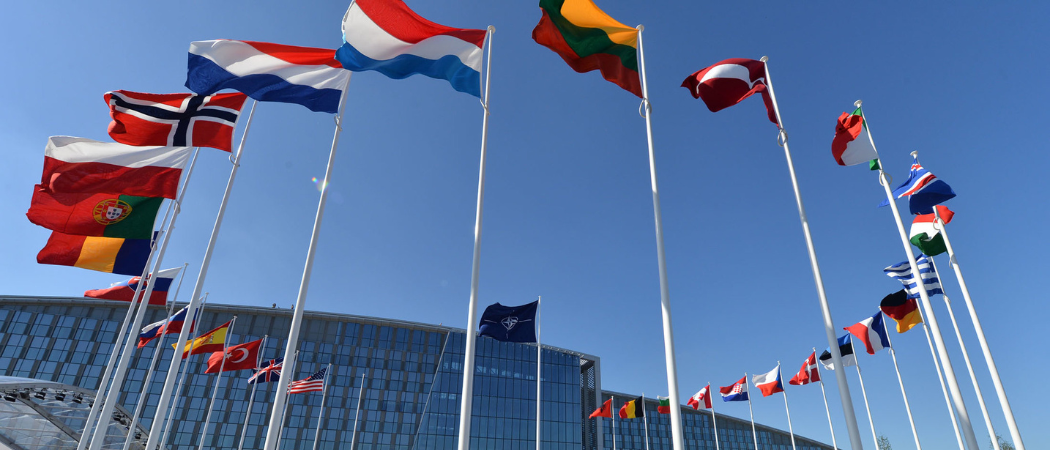The innovation programme for start-ups with dual-use technologies has announced a significant expansion of its network of accelerator sites and test centres

NATO Headquarters in Brussels, Belgium. Photo credit: NATO
NATO has announced a major expansion of its Defence Innovation Accelerator for the North Atlantic (DIANA) programme, which helps companies develop military applications of dual-use technologies, as it prepares to reach full operating capability in 2025.
DIANA brings start-ups, scale-ups and spin-out companies together with universities, industry and governments, while also providing a six month training course. It does this through a network of accelerator sites and test centres, and eligible companies may also receive funding from NATO’s €1 billion innovation fund.
The aim is to support the development of dual-use technologies, with a focus on deep tech that has civilian and defence applications, such as artificial intelligence, quantum computing, and novel materials.
The number of accelerator sites will rise from 11 to 23, while the number of test centres has gone up from 90 to 182, with the network now spanning 28 countries, NATO announced today.
“Part of DIANA’s strength is our unique transatlantic network of talent centres and innovation leaders working toward a common purpose,” said Deeph Chana, managing director of DIANA. “The breadth and diversity of partners in DIANA’s network will accelerate the development and deployment of ground-breaking solutions for defence, security and peace.”
DIANA launched its first three pilot challenge programmes in 2023, and in November announced that 44 companies had been selected to participate. Each company will receive €100,000, support to test their ideas, and commercial and technical advice.
The inaugural challenges focus on energy resilience, undersea sensing and surveillance, and secure information sharing.
Brainport embraces dual use
Safety and security has always been one of Brainport’s five focus areas, but DIANA’s emphasis on dual use will allow the region to include a wider range of companies, said Kevin van Lierop, strategy adviser at Brainport.
“What we did so far was mostly focusing on existing players and the existing ecosystem around the safety domain,” he told Science|Business. The NATO programme will bring more businesses in contact with the Ministry of Defence, and help them to diversify their products, giving the example of a battery producer which could discover military applications for its technology.
“Many companies don’t even know yet that they have a solution that can be applied to the safety domain,” van Lierop said. “We try to find out what are the needs from the ministry, and on the other hand, what are the possibilities we can bring to the table from our side. So it’s a matchmaking process.”
The programme is expected to benefit the regional ecosystem, by building links between companies, and with researchers. Brainport is hoping to leverage its expertise in specific areas such as integrated photonics and quantum, where there is “a lot of overlap” with DIANA’s focus areas, van Lierop said.
Together with the ministry, Brainport has also selected two military sites in the Netherlands to be used as test centres. van Lierop said this is unusual, as most test centres are focused on labs, and will allow solutions to be tested in real environments.
The decision to apply for DIANA status was one outcome of a memorandum of understanding Brainport signed in March 2023 with the Ministry of Defence, the Ministry of Economic Affairs, the Noord-Brabant province, and the Brabant Development Agency (BOM).
“We really see this accelerator programme as one of the building blocks for the bigger collaboration with the Ministry of Defence,” van Lierop said. This will draw on the €25 million security fund granted by the ministry which will provide venture capital to invest in innovative startups with dual-use technologies across the Netherlands.
With this funding, “we can guide businesses that are either not participating in the accelerator itself, or the companies that are coming out of it to see what they need in terms of further development for the growth of their business,” he said.
Transatlantic network
The other new accelerator sites for 2024 are located in Canada, Finland, France, Germany, Hungary, Latvia, Lithuania, Luxembourg, Portugal, and Spain.
The VTT Technical Research Centre of Finland is setting up an accelerator site in Otaniemi, Espoo, in collaboration with Aalto University and the University of Helsinki. It was a long-awaited decision, said Sauli Eloranta, vice president for defence at VTT.
“Our country has a large number of technologically advanced and innovative start-ups and SMEs, which have found it difficult to invest in export in the defence sector,” he said.
“DIANA will support this activity free of charge by using the accelerators to train companies in NATO technical and procurement requirements and by developing company-specific business training programmes.”
Finland will also be home to a test centre dedicated to 6G wireless technology, and another around cyber-secure communication, space, and quantum.
As well as supporting the accelerator programme, test centres are open to all companies in NATO countries, regardless of whether they belong to a DIANA accelerator. They provide expertise, services and infrastructure to companies for a fee.
An interactive map of all accelerator sites and test centres is available on the DIANA website. They were each nominated by their respective nations.
The EU is also looking to step up investments in its security, in the context of the war in Ukraine and the fact that many new technologies, such as drones and AI, are inherently dual use.
Earlier this year, the Commission launched a consultation on opening Horizon Europe to dual-use technologies, which currently has an exclusively civilian focus.





 A unique international forum for public research organisations and companies to connect their external engagement with strategic interests around their R&D system.
A unique international forum for public research organisations and companies to connect their external engagement with strategic interests around their R&D system.